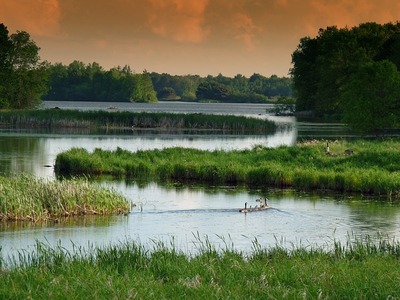Wisconsin Wetlands Could See More Protection After Supreme Court Ruling
Monday, June 5th, 2023 -- 10:00 AM

(By Danielle Kaeding, Wisconsin Public Radio) Wetlands in Wisconsin are likely to see less harm than other states after a recent U.S. Supreme Court ruling significantly reduced the authority of federal regulators to prevent pollution into certain wetlands.
According to Danielle Kaeding with the Wisconsin Public Radio, the conservative court recently ruled in a 5-4 vote that only wetlands with a “continuous surface connection” that join other large waterways like lakes and rivers may be regulated under the Clean Water Act.
Wetlands that are separated by berms or dikes would no longer be covered under federal regulation despite science that shows all waters are connected. The decision stemmed from a case brought by Idaho couple Chantell and Michael Sackett, who filled a lot on their property with dirt to begin building a home.
The Environmental Protection Agency said they violated federal law because the land contained wetlands near a ditch that fed a creek flowing into Priest Lake, and the Clean Water Act bars pollution into "waters of the United States."
Michael Cain is co-chair of the public trust and wetlands working group for Wisconsin’s Green Fire. He served for more than three decades as an attorney for the Wisconsin Department of Natural Resources, where he worked on development and enforcement of the state’s wetland programs.
"I've talked to a number of different people, including folks at the Department of Natural Resources, who think that they have shrunk the jurisdiction over coverage over approximately 50 percent of the nation's wetlands and ephemeral waters, which is troubling," Cain said.
Wisconsin has already lost about half of its wetlands over time. About 5.3 million acres of wetlands remain. The Department of Natural Resources said in a news release Friday that the court's ruling doesn't change Wisconsin's wetland regulations under state law.
"While the Sackett decision will likely remove federal jurisdiction and oversight from a large amount of Wisconsin's wetlands, the DNR will continue to implement the State’s uniform wetland regulatory program for projects that propose to impact wetlands in order to preserve and protect these critically important resources," said Tom Nedland, DNR Waterway and Wetland Policy Section Manager.
In Wisconsin, developers have to request a state exemption or get a permit for projects that would affect wetlands. The state requires developers to avoid discharges to wetlands when possible and minimize or mitigate harm from effects that can't be avoided.
Feel free to contact us with questions and/or comments.




